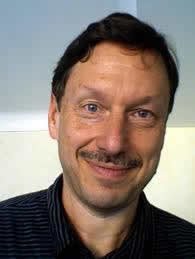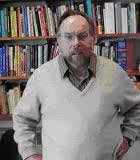Art and science historians headline new "transdisciplinary humanities" series at SU
Series part of new Transdisciplinary Humanities Project

Art historian James Elkins and science historian Michael Lynch will headline the first installment of “IMAGES? Precisely!,” a new lecture series presented by The Syracuse University Humanities Center. The multimedia program, which is free and open to the public, is on Friday, Oct. 7, from 1-2:30 p.m. in Grant Auditorium in the College of Law. For more information, call 315-443-7192 or visit http://syracusehumanities.org.
“IMAGES? Precisely!” is part of the center’s new three-year Transdisciplinary Humanities Project, led by Mark Linder, the inaugural Chancellor’s Fellow in the Humanities and associate professor in the School of Architecture.
“The series will feature influential scholars and artists whose work has contributed to new understandings of images as complex subjects of inquiry and as quickly evolving modes of cultural currency,” says Linder, author of “Nothing Less Than Literal: Architecture After Minimalism” (The MIT Press, 2004). “Images are a fantastic topic for transdisciplinary thinking, which demonstrates the malleability of disciplinary identities by operating at the limits of expert knowledge, where disciplinary rigor is still possible, but claims of authority or mastery must be abandoned.”
A native of Chicago, Elkins doubles as the E.C. Chadbourne Professor in the Department of Art History, Theory and Criticism at the School of the Art Institute of Chicago, and as the Clark Visiting Professor at the Sterling and Francine Clark Art Institute in Williamstown, Mass. He has authored many influential books, including “Visual Studies: A Skeptical Introduction” (Routledge, 2003), “The Domain of Images” (Cornell University Press, 1999) and “The Object Stares Back: On the Nature of Seeing” (Mariner Books, 1997). He has also edited numerous books, notably “Visual Literacy” (Routledge, 2007) and “Visual Practices Across the University” (Fink Wilhelm GmbH Co KG, 2007). Elkins is founder of the Stone Summer Theory Institute, a weeklong school of contemporary art in Chicago, and is co-editor of the institute’s “The Globalization of Art” publication.

Lynch is professor and acting director of graduate studies in science and technology studies at Cornell University. In addition to the production of visual images in science, he is an expert in science and technology studies; biology and society; ethnomethodology and conversational analysis; social theory and philosophy of social science; and the relations between law and science, with a focus on forensic DNA analysis. Lynch is the author of several books, including “Truth Machine: The Contentious History of DNA Fingerprinting” (University of Chicago Press, 2009) and “Scientific Practice and Ordinary Action” (Cambridge University Press, 1997).
“Our goal is to provoke discussions about possible transdisciplinary projects that, in turn, invigorate, clarify and expand our understanding of the role that the public humanities play in the academy,” says Linder, who teaches the new “IMAGES” seminar (ARC 500/HUM 500) in the SU Humanities Center. “Since the advent of photography and, more recently, of digital media, images have pervaded our world as not only representations of–but also fundamental assumptions about–knowledge, communication, identity, language, politics and art.”
Gregg Lambert, Dean’s Professor of the Humanities and director of both The SU Humanities Center and Central New York Humanities Corridor, echoes these sentiments. He explains how the Transdisciplinary Humanities Project is an extension of the Trans-Disciplinary Media Studio (TdMS), a Chancellor’s Leadership Project that originated in 2009 between The SU Humanities Center and School of Architecture.
“The Transdisciplinary Humanities Project is both an evolution of and a departure from TdMS,” says Lambert. “This project will engage with other areas of teaching and research on campus, including the digital humanities, which is both a new Excellence Initiative in The College of Arts and Sciences and an ongoing project of the CNY Humanities Corridor.”
Adds Linder: “I hope it will assemble new constituencies, and will introduce innovative approaches to research that are not traditionally understood as the province of any one discipline.”
The SU Humanities Center, founded in 2008, fosters public engagement in the humanities, and is home to the Syracuse Symposium, the Central New York Humanities Corridor, the Jeanette K. Watson Distinguished Visiting Professorship and Visiting Collaborator programs, the HC Mini-Seminar and Symposium Seminar series, the Perpetual Peace Project, and other annual research initiatives, annual fellowships, and public programming.
Media Contact
Rob Enslin
